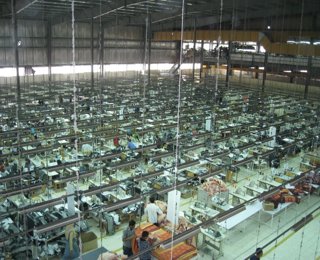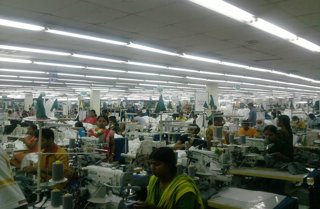His research focuses on issues related to global production networks, labour, and trade. We spoke to Shamel about these issues.
What are Global Production Networks, and why are they important?
In today’s world global production networks are behind most of the products and many of the services we consume on a daily basis. As part of globalisation processes, the way we produce goods and a growing number of services (such as food products, electronics, garments, cars, IT services) have changed. Growing number of goods and services today are the outcomes of global networks that link workers and companies across multiple countries in order to assemble and produce final products in a complex and highly dynamic process.
These global production networks are important because they explain the way we make things and the way we transform and consume natural resources. They are directly connected to broader key issues humanity faces, including economic and social development, poverty, environmental issues, employment, gender, working conditions, migration, and others.
So, when you say this is part of the shifts of globalisation, what is the difference between this and normal trade relationships that existed throughout history?
This is a key question. There is nothing new in trade. Nations have been trading with each other throughout history. You can say that there is more trade in today’s world than in previous historical periods but that is not the key difference. The issue is how trade is conducted and coordinated. Global production networks entail a growth in what we call coordinated trade. Coordinated trade can refer to either trade between different units in the same company; for example, a branch of Nokia in the UK selling products to Nokia in China. But it can also refer to trade between legally-independent companies, connected to each other through longer-term governance structures and relationships. The other key difference is that we see more trade in parts and components rather than final goods. Take a mobile phone, for example. Almost all mobile phones that we use today are produced in a relatively large number of countries. Each component could come from a different country. The software will come from another country. The design, marketing, administrative activities are all conducted in different places. The overall design might take place in France, the development of the software in the UK, the memory card in Korea, the screen in Singapore, and the assembly in the Philippines. What factors determine the location of each stage? How is this process coordinated? What labour and environmental conditions is each stage conducted under? And, crucially, when as a consumer I pay 100 pounds for a mobile phone, where is my money going and why? These are some of the questions at the heart of global production networks research.
Your research focuses on the area of labour in these networks? How is labour part of this story?
This globalisation of production entailed important shifts in issues around employment. The first element is related to jobs and job creation. Where jobs are being created and where they are lost is directly linked to changes in these global production networks. Understanding why each function is located in a specific place enables us to partially explain shifts in economic performance and employment. Global production networks are also connected to the type and quality of jobs. If I’m designing the software of the mobile phone, I might get 100 times more income than the person in a different country working on the assembly line to produce them. This has clear implications for development issues. Global production networks are also directly connected to the worst cases of labour issues we see around the world. Over the last few years, thousands of workers in Bangladesh died in devastating factory fires. These factories were producing for major retailers in the United States and Europe and the majority of those workers were earning less than 50 pounds a month. Understanding why these poor conditions exist, who is responsible for this, and how this can be changed is not only important for us as researchers and policy makers but also important for us as consumers and the way our buying decisions reflect our moral values. Research, alongside policy work and the work of activists and non-governmental organisations, could help bridge the geographical and information gap and enable us to make informed decisions when purchasing clothing or other goods and through that promote the positive aspects of the globalisation of production while limiting the negative aspects that we see. Studies have documented that a large number of workers in low-cost labour intensive industries in developing countries are women workers and the majority of workers who died in the factory fires were also female. Whilst the globalisation of production may have created more employment opportunities for women in developing countries, we also need to examine whether these women are being exploited for low wages, as they are often placed in jobs which pay less than their male counterparts.
Are working conditions in such cases driven by the global production network or by local factors in different countries? And what is the role of the national government in this?
Both. Global production networks play an important role in determining such conditions. In the garments industry, for instance, on-time delivery is a key requirement from global retailers to their suppliers. Suppliers are often punished for delays in delivery. This results in very long working hours in garment factories and sometimes in physical and verbal abuse of workers to speed up production. Wages are also directly linked to the price pressure from retailers on their suppliers. On a more positive side, global production networks can be vehicles for improving such issues by different policies at different levels that aim at improving the economic and the social benefits to developing countries and their workers.
National governments remain a key player in this but these shifts in production have affected the capacity and the role of national government in dealing with these issues especially in developing countries where the capacities of the state are generally weaker. This created what some people call a “governance deficit” where you have places with weak labour, environmental, and health and safety regulations integrated in producing for the global market. One response to this deficit has been what we call “private governance” through the role of global firms themselves in monitoring these conditions through codes of conduct but the limitations to this are becoming more evident.

An Asian Factory in Egypt. Source: Shamel Azmeh
You mentioned environmental issues, how are global production networks connected to the environment?
Global production networks are the processes through which natural resources are transformed into products and then disposed of after use. They are thus clearly linked to the environment. Similar to the discussion around working conditions, they reflect how we as humanity perceive and value the environment. In many industrial locations today, pollution is at extremely high levels. Do we prefer cheaper products at a high cost to the environment and to future generations? In a world facing growing environmental challenges, the way we produce, ship, consume, and dispose products is becoming vital. Global production networks are central to this.
What is the specific case that you looked at in your PhD research?
I looked into the case of the garments industry in Jordan and Egypt particularly movement of Asian companies and Asian workers to produce from the two counties to export to the United States. The two countries signed a trade agreement with the US that allow them to export duty free, without paying tariffs, to the US. As a result, a number of Asian companies invested in the two countries especially in Jordan and thousands of workers from Bangladesh, Sri Lanka, China, India, and other Asian countries were brought mainly to Jordan to work in garment factories. I looked into the link between these two types of flows, capital flows and labour flows.
Why do firms in Jordan bring workers from Bangladesh, Sri Lanka, India, China, and other Asian countries instead of hiring Jordanian workers?
This is related to local issues and to global production networks. I argued that ability to hire migrant workers enabled producing firms to build production systems that can meet the requirements of their US buyers in regard not only to cheap products but also to the pressure on on-time delivery I mentioned earlier. This is not limited to Jordan. A large percentage of workers in global production networks in many countries are internal and in some case external migrant workers. Some studies suggest that in some industries or activities migrant workers are preferred by companies due to the way migration creates a different type of worker who is more dependent on the company (in Jordan or in China, it is common for the migrant worker to live in dormitories owned and controlled by the company), weaker politically, and isolated socially and culturally. In many cases, regulations on the movement of people, sometimes in the same country, increase this power of companies vis-a-vis their workers and shape the labour force in a way that suits the requirements of global production networks.

Asian Workers in Jordan. Source: Shamel Azmeh
What kind of research methods did you use in this research?
Semi-structured interviews and trade data analysis. I conducted around forty semi-structured interviews in Jordan, Egypt, and Turkey, with producing companies, sourcing offices, labour organisations, and experts in the sector. In addition, I looked in detail at trade data of exports and imports to understand the overall patterns of trade linking Jordan and Egypt with the US market.
Were there any kinds of barriers or hurdles that you faced in doing this research and if so how did you go about overcoming them?
Mainly access to firms. The research in Jordan in particular was very difficult as the issue of working conditions is sensitive there. Many firms do not like to talk to researchers even if you assure them that their names will not be used. There are different ways of dealing with such issues. First, you persist. I used to call every single manager in the company separately and try to get them to talk to the general manager. Sometimes it works. Sometimes you might not get to talk to the general manager but someone else will talk to you. This could actually be useful as middle managers could be more open about discussing some issues than general managers. In a few cases, I gave up completely after many attempts. Also, in such environments, checking the accuracy of what you are being told is important and requires comparing what different actors are saying on the same issue. I also looked into other sources of information to overcome the access problem.
Shamel was interviewed in June 2014. View Shamel's twitter page @shamelazmeh




